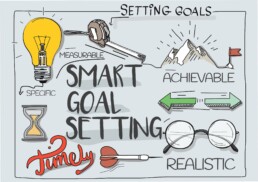The Value of a Planner
How good is your memory? Is short term memory a problem for you? Or is long term memory more difficult? Or are they equal? My memory is all over the place. I went to the market to buy juice and bought everything I hadn’t needed, but no juice. That’s what makes a list important. It’s planning ahead.
To know when your appointments are, or things you want or have promised to do, it makes sense to write them down. And you must write them all in the same place. Thus, a planner. Or a calendar of sorts will do. That way you have one place to turn to every day to see what you’ve got going that day, or to look ahead at the week, or even the month.
There are so many planners out there I could spend hours telling you about them and still not get through them all. There are entire planner systems designed for making and achieving goals. Someone has created a planner for just about every aspect of life. Paper or electronic, you could plan yourself to your last breath. Or you could keep a simple calendar and look at it regularly.
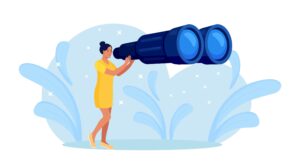 My dentist always asks me about scheduling an appointment six months out from my current appointment. E.g. “Are you free September 4th?” How would I know that? Fortunately, I have a calendar in my phone and can scroll to September, check the date, and enter the dentist appointment. Now I won’t schedule anything else for that time. I may even set a reminder to make sure I leave the house on time.
My dentist always asks me about scheduling an appointment six months out from my current appointment. E.g. “Are you free September 4th?” How would I know that? Fortunately, I have a calendar in my phone and can scroll to September, check the date, and enter the dentist appointment. Now I won’t schedule anything else for that time. I may even set a reminder to make sure I leave the house on time.
I have a friend I have dinner with every Saturday. If I call her earlier in the week to make a plan (in case we need a reservation), she never has an answer. Only on Saturday afternoon can she come up with an idea. She does not have a planner.
To take charge of your life you need to plan how your life will unfold rather than just letting it happen.
Life is never as easy as we plan it to be; however, having a planner makes the bumps of real life easier to deal with.
- Sydney Metrick
Goals vs. Resolutions
Are you a person who makes a list of resolutions at the start of a new year? Do you carry through with them or find that they have fallen by the wayside?
The problem with resolutions is there is little to define them except knowing what it is you want (or don’t want).
Goals, on the other hand, give you a framework to make it more likely you will end up with what you had intended. I’m sure by now you’ve heard of SMART goals. It has become a bit of a buzzword.
Let’s say you want more time in the evenings to relax.
First, your goal must be Specific. More and less are not specific words. If you want “more” free time, you need to define what that looks like to you.
Next is Measurable, this is part of being specific. How much time do you want for evening relaxation? 20 minutes? Two hours?
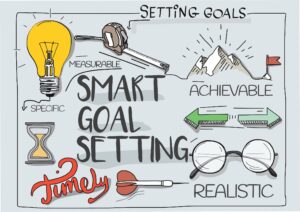 A is for Achievable. It is not likely that you can set aside two hours every evening for relaxation; the 20 minutes, however, is much more achievable.
A is for Achievable. It is not likely that you can set aside two hours every evening for relaxation; the 20 minutes, however, is much more achievable.
Is it Realistic? Given your life and schedule, what would you have to give up or do much faster to carve out two hours of free time every evening?
Finally, Time sensitive. When will you begin doing this? Frequently, goals are something that we need to work up to. Maybe you start with five minutes and increase steadily from there. At what point will you reliably have that desired amount of relaxation time?
Bonus attribute: Accountability. While not required for a SMART goal, it makes success more likely – and sometimes easier. Is there someone, personal or professional, who can check in with you weekly to make sure you’re keeping up?
There you have it—a formula for success. And, since every day is the first day of a new year, you do not need to wait for January to set new goals.
- Sydney Metrick
Overwhelmed?
Do you ever feel overwhelmed? There’s just too much happening at once. You have bills to pay, appointments to make, places to go, organize your house and maybe your office, assignments due, people to take care of, and so on.
 Or have you ever been in a restaurant full of people talking at other tables, and a musician singing loudly in the background?
Or have you ever been in a restaurant full of people talking at other tables, and a musician singing loudly in the background?
What you might be experiencing is sensory overload. When I’m trying to write a newsletter, and someone is mowing their lawn nearby, and a large truck is rambling up the road, and my husband is trying to talk to me, and the phone is ringing, and my sweater itches…you get the picture—sensory overload.
Overwhelm and overload are both too much.
When overwhelmed, take control of your schedule by deciding what’s important and what can wait.
With overload, if you can cut out distractions – put the phone on silent, put on a comfy sweater – do. A pair of noise-canceling earphones can do wonders with overload.
Life happens, there’s no controlling that. It’s up to you to realize it’s normal and find solutions that work for you.
- Sydney Metrick
Why Fidget?
Are you a fidgeter? Do people tell you to stop fidgeting? Well, don’t listen to them. Fidgeting is good for you, especially if you have ADHD. The H stands for “hyperactivity” and fidgeting falls into that category.
Why is fidgeting good? Well, if you’re feeling overwhelmed it can help calm you. If you’re agitated it’s a way to release energy.
On the other hand, if you’re underwhelmed it can get the dopamine in your brain flowing again. Fidgeting keeps your brain awake.
Whether you’re playing with a squeeze ball or a pen, shaking your leg, or twiddling your fingers, there are many ways people fidget.
Physical fidgeting – tapping your foot, bouncing your leg – can help keep blood flowing when sitting for long periods. While not recommended as a dieting technique, fidgeting also burns more calories than just sitting still.
Because focusing on a specific task generally requires only part of the brain, other parts can get bored. Those parts then get distracted and take your focus with them. For many, doing something small and physical gives focus to the parts of the brain not needed for the task at hand.
As an example, I have one client who is positive that if she had understood how to occupy the non-learning sections of her brain at the time, she would have done much better in college. She frequently fell asleep or “spaced out” because she couldn’t appropriately focus on lectures.
By the way, fidgeting is fine for those who do not have ADHD as well. In the age of online everything, we all find ourselves sitting more and for longer periods than what evolution has built us for.
- Sydney Metrick
Do you have ADHD?
Sometimes I get coaching calls from people who say they’re not sure if they have ADHD.
There are so many different symptoms and at various severities that it can be confusing. Add in all the hype, information, and dis-information, and it is easy to understand why adults who are undiagnosed can feel lost.
Because an ADHD diagnosis depends on having multiple symptoms for multiple years, let me offer some of the common behaviors to look for:
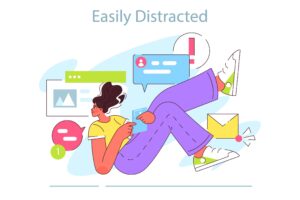 Trouble paying attention, easily distracted
Trouble paying attention, easily distracted- Skipping from one activity to another, not able to persist at an activity for the time required to complete it
- Impulsive behavior
- Restless and fidgety
- Verbally impulsive, blurting out things as they come to mind
- Ideas skipping from one to another
- Don’t always think before acting
ADHD is an executive function disorder. Executive function lives in the frontal lobe of your brain and is your ability to self-regulate and get things done. When executive function is not working correctly, people tend to lose organizational control as well as their ability to properly adapt to situations.
The important thing to keep in mind is that all brain function is chemical. If your brain chemistry is off – due to genetics or environment – there is no permanent solution. However, treatment can provide temporary relief as well as coping mechanisms.
ADHD treatments include medication, therapy/behavior modification, lifestyle changes, or a combination. Figuring out what works best for you is best done with your health care provider.
Personally, coaching helped me. Talking with someone who knows about life with ADHD (not just studied it) kept me from feeling isolated or like I had totally lost my mind.
Three Really Great Problem Solvers!
Do any of these sound familiar?
- You have a great idea in the shower and then forget it by the time you’re dressed.
- A task you thought might take an hour actually takes three.
- You sometimes get so caught up in one thing that you’re late for something else.
- Prioritizing your schedule to address all your “to do’s” feels impossible.
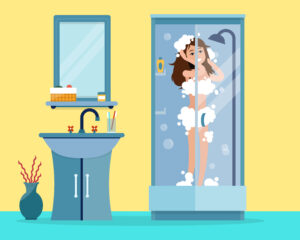 Solutions exist. I like things to be simple and easy to use so these three tools have passed muster. They are AquaNotes, Time Timer, and Planner Pads.
Solutions exist. I like things to be simple and easy to use so these three tools have passed muster. They are AquaNotes, Time Timer, and Planner Pads.
- Because they say it best, I’m just going to quote from the AquaNotes website: “If you find that some of your best ideas and insights are generated in the tranquility and solitude of the shower...then AquaNotes® is for you! These waterproof notepads help you capture and preserve your ideas before they're forgotten!” The 40 sheet, refillable pad suctions to your shower wall and even comes with matching pen.
- Time Timer has a line of timers, watches, and applications that helps you stay on track. By setting the amount of time you want to spend on a task, Time Timer provides a bright visual of the time gradually elapsing – letting you know when you are getting to the finish – and an alarm to tell you when you are done and need to move on.
- The Planner Pad is an easy-to-use system that help you organize, prioritize, and schedule in ways that make sense. They even have a way of keeping track of items that didn’t get done.
Even the websites are user friendly. Check them out. Let me know if you start using any of them and tell me about your experience.
- Sydney Metrick

